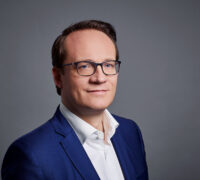“We started with a very small holding company managing the different businesses. I do still remember when we were only 70 people in that company steering the group; that was kind of really a startup mentality, so that we could start everything from scratch with all the learning without the burden from the past,” he explained.
RWE today now has a decentralized structure with the group focusing on strategy and capital allocation, while its six business units operate as independent and autonomous subsidiaries. Krebber credits this structure for helping RWE stay nimble during the energy crisis triggered by the war in Ukraine. “All the nitty-gritty in crisis management was done without group involvement,” he explained. “And there we could really focus on the big decisions, and that, in the end, helped.”
The crisis was not only a huge test of Krebber’s leadership but also a learning experience. As a major German energy company, Krebber found himself advising the government on how to avert a severe energy crisis. “We were the first one proposing floating LNG (Liquefied Natural Gas) terminals. I mean getting the ships, getting the infrastructure within months that we could import LNG into Germany, which so far had no LNG terminal,” he said.
Even when confronted with the need to make quick decisions with imperfect information, Krebber said his biggest learning was not to lose sight, amid all the chaos, of your objectives.
“In the midst of the crisis, we did the big US acquisition and we agreed with the German government to exit coal by 2030,” he said. “So, in the long term, it was not about the crisis; in the long term, it was sticking to your strategic plan. And I’m very proud of the team that we actually managed it all.”
Watch the full CEO Dialogue to find out more about Markus Krebber’s views on energy transition (including European vs. US incentives for clean technologies and how geopolitical tensions can affect the speed and cost of transition), the transition from the CFO to CEO role, and why hard-to-abate industries may increasingly move to where green energy is produced, including and especially the Middle East.
YouTube



